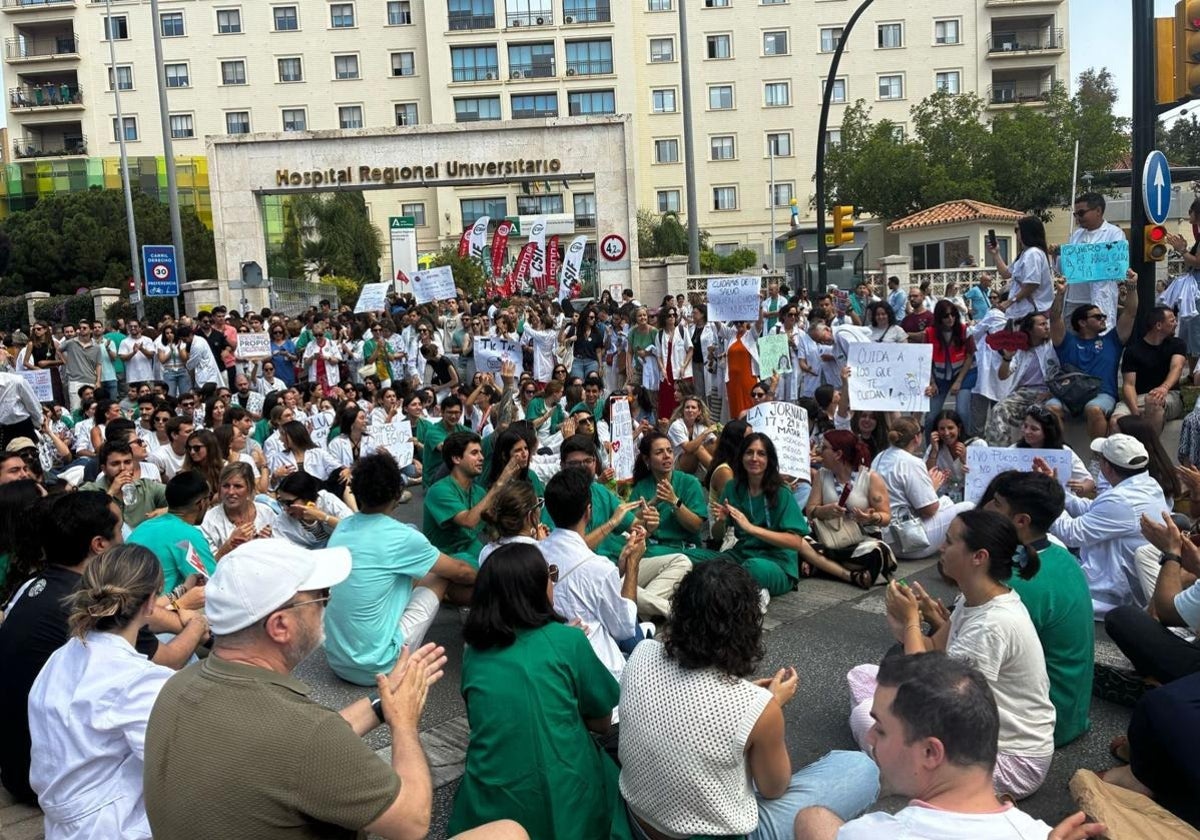More than 5,700 doctors in Malaga are urged to take part in new strike
The doctors reject the health minister's claims that most of the demands 'are already resolved' and demand change to the legal framework for healthcare workers' rights
Doctors from all over the country supported the strike called by the Spanish confederation of medical unions (CESM) and the Andalusian medical union (SMA), which took place on 10 June. The aim of the strike was to reject the draft of the legal framework outlining healthcare workers' rights and duties. Now, the unions are urging healthcare professionals to join another nationwide strike on 10 October, with demonstrations in the main provincial capitals.
With that said, the 5,700 doctors working in Malaga province's public health system have been called to join. During the strike on 10 June, more than 1,000 doctors blocked traffic on Avenida Carlos Haya, chanting slogans such as: "Mónica García, we will come back another day", "It is not vocation, it is exploitation", "Hands up, this is a robbery", "Ministry of precariousness", "We do not ask for privileges, we ask for justice", "Stop abuses", "With this ministry, I'll go abroad" and "Tired doctor, mistreated patient".
According to the protest's organisers, 95% of doctors took part in the strike, which highly constrasts the 52% registered by the delegation of health and consumer affairs.
On 17 June, the SMA said that the strike was massively supported, especially by 100% of the MIR collective, who feel "undervalued" and underpaid. The unions demand their own legal framework that takes into account "the particularities of the medical profession and gives them an independent bargaining area", since the current regulation of their working conditions "systematically sacrifices their rights for the sake of the sustainability of a public system with chronic structural deficiencies".
Medical unions accuse the minister of health - Mónica García - of publicly disparaging doctors in order to discredit those calling the strike and criticise her for assuring that many of the demands of healthcare workers have been resolved.
Among doctors' expectations from the new legal framework is that working times are regulated so that there are no marathon shifts and that a new professional classification system is established in a way that it recognises the years of training and specialisation.
The SMM also demands "a unified compatibility model for all of Spain that does not involve any reduction in pay for professionals with dual employment; a regulation that contemplates flexible retirement between the ages of 60 and 70, including voluntary, partial and early retirement, taking into account the appropriate reduction coefficient; and calculation of on-call hours for retirement".
"We also reject the forced mobility that is imposed and a performance appraisal model that discourages rather than motivates," the union said.
In a press release sent out on 20 June, the SMM and CESM stated that "everything that minister Mónica García has stated is false". García, among other things, said that the draft for the new framework eliminates the obligation to return the hours of on-call duty and reduces the limits of the weekly working day. She also said that, while protests are legitimate, "some demands are not". As an example, she cited the supposedly illegitimate demand to prevent nurses from updating their roles based on their training.
Regarding retirement, García stated that doctors retire based on years worked, not hours and that all working hours, including on-call shifts, are counted towards Social Security contributions.
Assessment of the medical strike and demands
The president of the Malaga college of doctors, Pedro Navarro, stated that "defending the medical profession means defending the quality of care received by the population. Attempts have been made to regulate the profession behind the doctor's back, when we have been asking for 20 years for the framework to regulate doctors' working hours and, above all, their responsibilities". Navarro stated that doctors have a 48-hour working day as opposed to the 35 hours that are demanded. "The contribution for overtime on call" is paid well below what the collective considers and does not count towards retirement. In addition, doctors have a responsibility to competence, which requires a long study and training period, which is not the same as in other professions. According to the unions, this justifies their demand for this dedication of time to be counted towards employment years.
SMA general seccretary Ana Duarte said that the doctors' shifts can sometimes extend to "brutal" and compulsory 24 hours, which are not paid as overtime. Duarte said that, while it is already abominable for a doctor to have a 60- or 70-hour working week, some work for 100-120 hours a week.

